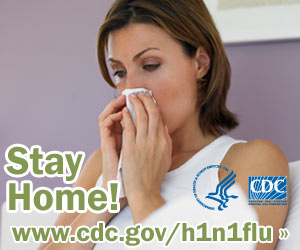DEPARTMENT OF HEALTH CONFIRMS FIRST CASES OF H1N1 INFLUENZA A (SWINE-ORIGIN FLU)
 The Hawai’i State Department of Health (DOH) received laboratory confirmation today from the U.S. Centers for Disease Control and Prevention (CDC) on three cases of novel H1N1 Influenza A (swine-origin flu). The three confirmed cases are O’ahu residents; two are adults, one with recent travel to Texas and the other becoming ill after exposure to their spouse. The third separate case is a school-aged child with recent travel to California. All have recovered at home and are no longer contagious. At this time, there are no new probable cases.   With the confirmed cases, Hawaii joins at least 38 others states already on the list of places with confirmed swine flu activity. State health director Dr. Chiyome Fukino says the most effective way to protect youthelf and others is to stay home if you’re sick, cover your mouth when coughing or sneezing and washing your hands frequently with soap and water.
The Hawai’i State Department of Health (DOH) received laboratory confirmation today from the U.S. Centers for Disease Control and Prevention (CDC) on three cases of novel H1N1 Influenza A (swine-origin flu). The three confirmed cases are O’ahu residents; two are adults, one with recent travel to Texas and the other becoming ill after exposure to their spouse. The third separate case is a school-aged child with recent travel to California. All have recovered at home and are no longer contagious. At this time, there are no new probable cases.   With the confirmed cases, Hawaii joins at least 38 others states already on the list of places with confirmed swine flu activity. State health director Dr. Chiyome Fukino says the most effective way to protect youthelf and others is to stay home if you’re sick, cover your mouth when coughing or sneezing and washing your hands frequently with soap and water.
“Our department continues to aggressively monitor for and investigate flu cases as we move into the next phase of our identification and testing of illness in the state,” said Fukino.
“While influenza illness in our state appears to be uncomplicated at this time, we continue to lean forward with an abundance of caution,” said Dr. Sarah Park, State Epidemiologist and Chief of the Disease Outbreak Control Division.
“Our staff has been moving quickly and diligently to investigate suspected cases, determine any health risks, and provide precautionary measures to reduce and control any further spread of disease,” said Park.
“Tests conducted by our state laboratory show that in addition to the novel H1N1 viral strain there is still seasonal flu in Hawai’i,” said Dr. Fukino.
“The most important thing to do right now is to stay informed and to take common-sense steps to protect your health and the health of your family. The most effective ways to protect yourself and others from novel H1N1 and seasonal flu are by staying home if you’re sick, coughing or sneezing into your sleeve, inside of your upper arm or elbow, or a tissue, and washing your hands frequently with soap and water,” said Fukino.
Novel H1N1 flu cases have been confirmed in at least 38 states so far, and more cases are expected. As of today, CDC is reporting 403 confirmed cases nationwide.
Anyone experiencing flu-like symptoms, especially those who have traveled to the mainland United States or Mexico, should call a doctor and isolate themselves from other people. Proper hand-washing can help prevent contracting the virus, and people should cover their cough or sneeze.
For questions about novel H1N1 flu, possible symptoms, travel information or other issues related to this illness residents may call 1-866-767-5044 ext. 3 between 7 a.m. and 7 p.m. Monday through Friday, and on weekends from 9 a.m. to 5:30 p.m. For more information on swine flu, visit www.hawaii.gov/health or the Centers for Disease Control and Prevention (CDC) at http://www.cdc.gov/h1n1flu.
(Posted by Wendy OSHER © 2009)










